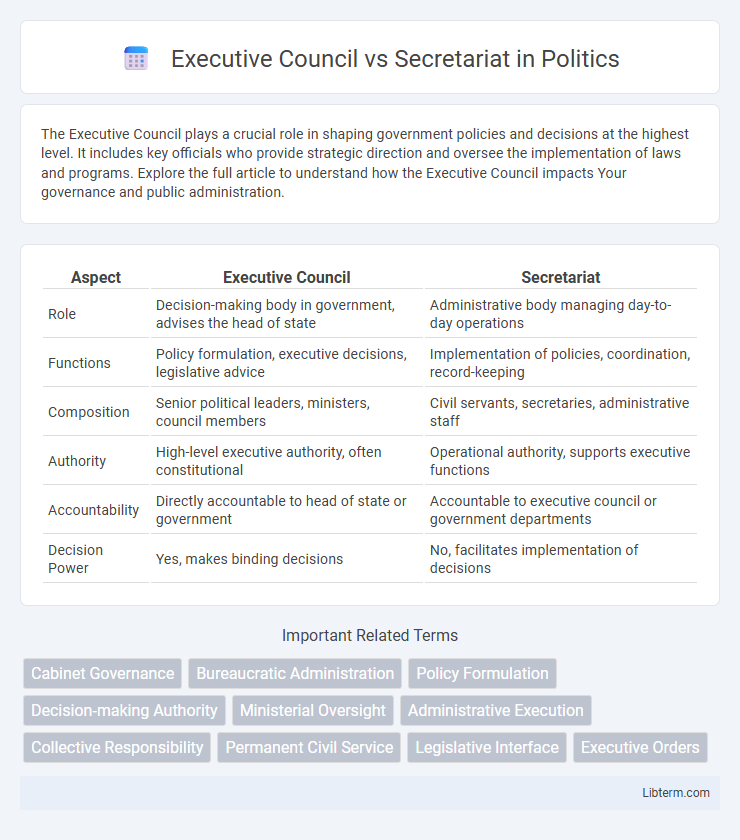The Executive Council plays a crucial role in shaping government policies and decisions at the highest level. It includes key officials who provide strategic direction and oversee the implementation of laws and programs. Explore the full article to understand how the Executive Council impacts Your governance and public administration.
Table of Comparison
| Aspect | Executive Council | Secretariat |
|---|---|---|
| Role | Decision-making body in government, advises the head of state | Administrative body managing day-to-day operations |
| Functions | Policy formulation, executive decisions, legislative advice | Implementation of policies, coordination, record-keeping |
| Composition | Senior political leaders, ministers, council members | Civil servants, secretaries, administrative staff |
| Authority | High-level executive authority, often constitutional | Operational authority, supports executive functions |
| Accountability | Directly accountable to head of state or government | Accountable to executive council or government departments |
| Decision Power | Yes, makes binding decisions | No, facilitates implementation of decisions |
Introduction to Executive Council and Secretariat
The Executive Council serves as the primary decision-making body, responsible for formulating policies and strategic direction within an organization or government. The Secretariat functions as the administrative arm, providing essential support, coordination, and implementation of the decisions made by the Executive Council. These two entities work collaboratively to ensure effective governance and operational efficiency.
Historical Background of Both Entities
The Executive Council traces its origins to colonial governance structures where it served as an advisory body to the governor, evolving into a pivotal decision-making assembly in modern administrations. The Secretariat emerged primarily as the administrative backbone supporting the executive branch, responsible for implementing policies and coordinating governmental departments. Historically, the Executive Council has wielded political authority, while the Secretariat's role centers on bureaucratic management and execution of council directives.
Core Functions and Responsibilities
The Executive Council primarily establishes strategic policies, approves budgets, and oversees overall organizational governance, ensuring alignment with long-term goals. The Secretariat manages daily administrative operations, implements Council decisions, and coordinates communication between departments and external stakeholders. Core functions of the Executive Council center on decision-making and policy formulation, while the Secretariat focuses on execution, compliance monitoring, and support services.
Structural Differences
The Executive Council operates as the main decision-making body, responsible for policy formulation and strategic oversight, typically composed of senior officials or ministers. The Secretariat functions as the administrative backbone, managing daily operations, coordination, and implementation of Council decisions, often staffed by career bureaucrats or support personnel. Structural differences include the Executive Council's focus on governance and strategy versus the Secretariat's emphasis on administration and execution within organizational hierarchies.
Key Roles and Membership
The Executive Council serves as the primary decision-making body, comprising senior officials and representatives responsible for setting strategic policies and overseeing organizational objectives. The Secretariat functions as the administrative backbone, staffed by professional experts who implement the Executive Council's decisions and manage day-to-day operations. Membership in the Executive Council typically includes government ministers or high-ranking executives, whereas the Secretariat consists of career civil servants or appointed administrative personnel.
Decision-Making Processes
The Executive Council holds primary responsibility for high-level decision-making, setting strategic policies, and approving major initiatives within an organization. The Secretariat supports the Executive Council by managing administrative tasks, facilitating communication, and ensuring the implementation of decisions through coordination and documentation. Decision-making authority resides predominantly with the Executive Council, while the Secretariat plays a crucial operational role in executing and monitoring these decisions effectively.
Relationship and Interactions
The Executive Council sets strategic policies and makes high-level decisions, while the Secretariat executes these decisions through administrative and operational support. The Secretariat acts as the communication hub, facilitating coordination among various departments and ensuring timely implementation of the Council's directives. Continuous interaction between the Executive Council and Secretariat ensures alignment of organizational goals with day-to-day operations.
Influence on Policy Implementation
The Executive Council holds significant influence on policy implementation by making high-level decisions, setting strategic priorities, and overseeing major administrative actions, ensuring policies align with organizational goals. The Secretariat plays a crucial role in translating these decisions into operational plans and coordinating between departments to execute policies efficiently. Together, the Executive Council's strategic directives and the Secretariat's administrative support create a comprehensive framework for effective policy execution.
Examples from International Organizations
The Executive Council typically serves as the main decision-making body in international organizations, such as the United Nations Security Council, which holds authority over peace and security matters, or the World Health Organization's Executive Board, responsible for implementing policies set by the World Health Assembly. The Secretariat, exemplified by the United Nations Secretariat led by the Secretary-General, provides administrative support, executes decisions, and manages day-to-day operations across various organizations. These distinct roles enable efficient governance by separating policy-making functions from operational management within entities like the International Labour Organization and the World Bank.
Conclusion: Comparative Analysis
The Executive Council primarily functions as the top decision-making authority, setting policies and strategic direction for an organization, while the Secretariat serves as the administrative backbone, ensuring effective implementation and coordination of the Executive Council's decisions. The Council's role emphasizes governance and leadership, whereas the Secretariat focuses on operational support and communication management. Effective organizational performance depends on the clear delineation and collaboration between these two entities to balance strategic oversight with efficient execution.
Executive Council Infographic

 libterm.com
libterm.com